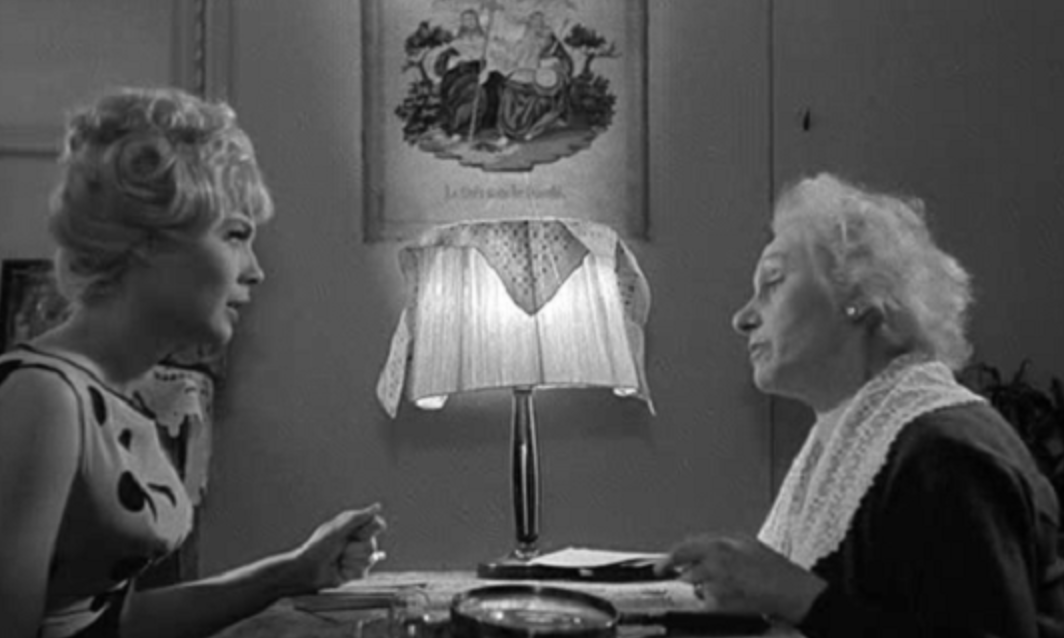Following La Pointe Courte in 1955, considered by many to be a foreshadowing of the full-tilt French New Wave movement, Agnès Varda’s second feature, Cléo from 5 to 7, was something of a departure from the motif of her debut. While both still favored the saturation of a certain malaise–an existential crisis, if you will–Cléo’s (Corinne Marchand) fragility stems not from a problem of domesticity, but the self. Verily, it is precisely because of her wrapped uppedness in the self that she is being driven to the verge of a casual breakdown. The cause of her more pronounced self-obsession of late? Potentially life-threatening test results from the doctor. Convinced she has fatal cancer, Cléo’s day from five to seven commences at the fortune teller’s, who, in spite of a few false starts, fundamentally has her life pegged–from the widow, Angèle (Dominique Davray), who is overly devoted to her but basically inutile for emotional support and advice to the man who got her started in music, José (José Luis de Vilallonga), that rarely makes appearances in spite of being her so-called boyfriend.
Morose over the fortune teller’s reading and her refusal to tell her the results she finds from a glance at her palm after looking at it, Cléo departs with tears in her eyes. She consoles herself in one of several jarring voiceovers by insisting to herself, “As long as I’m beautiful, I’m alive.” And it’s true, Cléo is beautiful in recompense for her vacancy. So she does what any frivolous girl does best: goes shopping. At the hat store with Angèle, she remarks wistfully–again, in one of those unexpected voiceovers–“Everything suits me.” But with the portent of an existence cut short while still in her prime, the beauty she assures herself of feels somehow irrelevant, and Cléo seems to become more filled with depth beneath her usual melodramatic antics. Antics that she’s apparently well known for as her songwriting team pays her a visit while she’s moping around her bedroom after a typically unsatisfying pop-in from José. Bob (Michel Legrand, real life music composer of such famed scores as The Umbrellas of Cherbourg) and Antoine (Antoine Bourseiller) mock her intelligence by asking her to sing a song that she feels is too depressing for her usual oeuvre. She even wells up, once again, thinking about her own fate as she croons the lyrics, “Beauty wasted… gnawed away by despair, my body decays on a crystal bier. If you wait to long, I’ll have been laid to rest.” Not exactly mainstream top forty material. At least anywhere outside of France, where existentialism remains forever hip. So it is that Cléo, fed up with everyone’s insensitivity, decides to take a walk on her own, putting on the new hat that Angèle warned her not to don (it’s bad luck to wear a new hat the day you buy it, according to Angèle’s words of wisdom).
Along the way, she comes into contact with some extraordinary revelations amid her quotidian activities (Varda’s modus operandi in film), including, “I thought everyone looked at me. I only look at myself.” The realization of her overly stylized vanity prompts her to take off her hat, continuing about her constitutional until she interrupts her friend, Dorothée (Dorothée Blanck), at the art school she’s posing nude in. A drive across town familiarizes Dorothée with Cléo’s grave situation, and she, in turn, shows more empathy than anyone else Cléo has interacted with in the past hours.
When their rendezvous is cut short by Dorothée’s need to return to the school, Cléo finds herself roaming in the park alone–that is, until she encounters a very talkative soldier on brief leave from the Algerian War (which ended the year Cléo from 5 to 7 was released). At first timid and irritated by him, Cléo begins to forget about herself as she learns of his story, middling though it may be. And she soon apprehends that their potential fates aren’t so different, except, as she says, “Dying for nothing. That’s what upsets me.” But what is something, anymore? A cause that’s worthwhile. Love? How quaint. Maybe in Cléo’s day, but certainly not now. Surely the soldiers that went to war in Algeria would tell you that wasn’t worth it either. No, what Cléo from 5 to 7 eventually suggests to us, through all its seemingly banal scenes, is that we must learn to treat life as something tenuous regardless of whether we’re healthy or not. That unlike Cléo, we must not await the arrival of calamitous circumstances to finally regard life as something to be valued instead of balked at for all its rifeness with inconvenience. As is the Varda way, Cléo from 5 to 7 seeks to reaffirm the Pollyanna-tinged cliche that yes, life is filled with “something about everything that you can be glad about, if you keep hunting long enough to find it.” And further, as Cléo’s unknown results loom larger by the second, “Just breathing isn’t living.” It’s how you engage with the world around you while breathing that lends existence its value and sumptuousness.





















